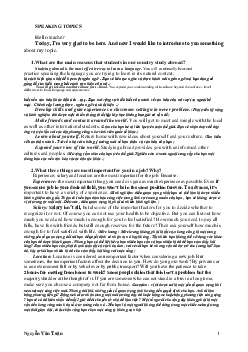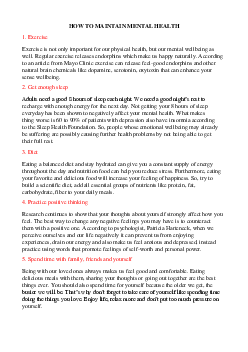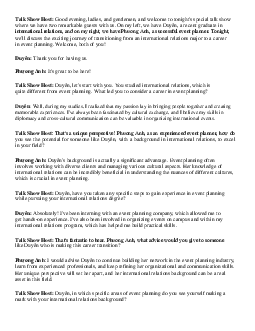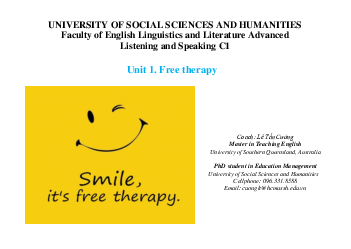



Preview text:
B1 LISTENING AND SPEAKING FINAL TEST GUIDE
by Tran Quoc Thinh (M.A.) 09.71.71.72.71
• SPEAKING (50%) + LISTENING (50%) = FINAL SCORE
• FINAL SCORE (70%) + MID-TERM SCORE (30%) = WHOLE COURSE.
Final Listening test format: 1. Filling in the blanks 2. True or False. 3. Multiple choice.
4. Short answers. (answer the questions with no more than 3 words)
Sources for practice: Part 1& 2 of IELTS. PET Cambridge.
SPEAKING TEST PROCEDURE
Students get in the test room in pairs, according to the name list.
Student A: receives a question, gets prepared in a minute, then answers the question from 1 to 2 minutes. Student B: does the same.
After that, both of them are given a topic, which is also a question. They get ready in a minute,
then discuss it from 2 to 3 minutes.
TIP: You should bring your Student card, a piece of paper and a pen to take some notes. When talking,
try to be natural, fluent and develop your ideas clearly and thoroughly. Your ideas don’t have to be
interesting, profound or scientific but the way you develop and clarify your ideas matters. TOPICS: ( from the B1 text book) 1. Secret wishes.
2. Changing climate, changing minds. 3. Unexpected discoveries. 4. The business of style. 5. Engineered by nature 6. Lending a hand. 7. Less is more lOMoAR cPSD| 41487872 8. Justice in the jungle. SAMPLE TEST QUESTIONS
Please note that these are probably not the questions you may see in the real test Topic 1: Secret wishes
Student A: What kinds of secrets do people usually keep?
Student B: Why do you think some people want to share their secrets with others?
Discussion topic: Which is easier: sharing your secrets with closed people or with strangers?
Topic 2: Changing climate, changing minds.
Student A: Have there been any dramatic climate changes in your country in the last 10 years?
Student B: What do you think are the consequences of climate change in our life?
Discussion topic: Why do very few people care about climate change?
Topic 3: Unexpected discoveries
Student A: what skills do you think an inventor needs to have?
Student B: what inventions do you think are the most useful to our modern life?
Discussion topic: What are some good ways to make children more imaginative?
Topic 4: The business of style
Student A: Can you name some ways to use technology in the production or sales of something?
Student B: What clothing brands are dominant for young people? Why are they popular?
Discussion topic: How do our fashion choices (shoes, clothing, hair, jewelry etc.) express our personal identity? lOMoAR cPSD| 41487872
Topic 5: Engineered by nature
Scientists sometimes copy nature to create new products (shark’s skin, Kingfisher’s beak, mosquito’s needle)
Student A: why do people need robots in their life?
Student B: What do you think is a computer’s most important capability?
Discussion topic: Some people are afraid some jobs will disappear in the future because of robots and
super computers. What do you think about this issue?
Topic 6 : Lending a hand
Please search what they mean: micro loans (micro-lending), Loan-sharks, transparency.
Student A: How do you think micro-loans can help people get out of poverty?
Student B: Do you think borrowing from loan-sharks is a good option when you need money?
Discussion topic: Do you think donating directly the poorest people in the world is a better idea than
giving it through aid agencies? Topic 7: Less is more
Student A: Do you think having more choices in life is always a good thing?
Student B: Some people are perfectionistic when buying things or doing things. How about you?
Discussion topic: Some people believe minimalism can lead to more happiness. Do you agree?
Topic 8: Justice in the Jungle
Student A: Why do some people like to keep a wild animal as a pet?
Student B: What are the consequences of wildlife trafficking?
Discussion topic: What can the government do to protect wildlife and their habitats? Good luck to all ☺ lOMoAR cPSD| 41487872




